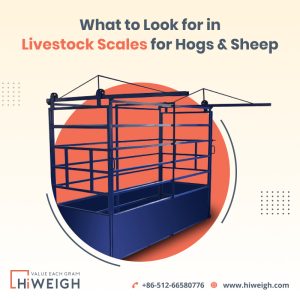


Precise weighing of hogs and sheep is a necessary job for livestock producers. Whether breeding, tracking health, or getting animals ready for market, a quality livestock scale can be a vital difference-maker. Selecting the correct scale means knowing the most important features that guarantee accuracy, longevity, and usability. Below, we detail the most important features to look for when buying livestock scales for sheep and hogs.
1. Build Quality and Durability
Hog sheep scales are exposed to rough environments, including mud, water, and constant animal movement. It is vital to choose a scale with robust construction. Look for scales made from heavy-duty steel or high-grade aluminium with rust-resistant coatings. These materials ensure the scale can withstand the rigours of daily use without deteriorating. Non-slip platforms are also essential to provide stability and prevent animals from slipping during weighing.
2. Capacity and Size
The scale should have the right weight capacity to support hogs and sheep of different sizes. For example, hogs weigh between 100 and 400 pounds, and sheep typically weigh 100 to 200 pounds. Choose a scale with a weight capacity that can support your livestock comfortably. The platform size should also be big enough to hold the animals securely but small enough to fit your available space.
3. Portability
Some of these livestock operations necessitate the need to relocate scales from one area to another, for instance, between barns, pastures, or loading docks. Wheels or handles on portable livestock scales facilitate easier transportation of the equipment to where needed. Durable and lightweight constructions are especially useful for farmers with multiple locations.
4. Weather-Resistant and Waterproof Design
Because livestock scales are usually placed outside, they need to be resistant to rain, mud, and humidity. Waterproof or weather-resistant scales guarantee durability and consistent performance regardless of the weather. Scales with sealed load cells and electronics offer extra protection from moisture and dirt, guaranteeing accurate readings even in extreme environments.
5. Precision and Accuracy
Accuracy is not a negotiable aspect of livestock scales. Weight inaccuracies can result in problems with feeding, medication dosing, and pricing at market. Digital scales generally offer greater precision than analogue scales, sometimes with accuracy to a fraction of a pound. Consider scales with newer load cell technology and calibration capabilities to ensure consistent accuracy.
6. Simple-to-Read Displays
Livestock weighing is usually done under difficult conditions, e.g., low-light or outside environments. Scales that feature large, backlit digital readouts ensure the weight is easily readable even from across the room. Additional wireless display or mobile app support on some models permits remote monitoring of weight data.
7. Animal Motion Compensation
Animals do not like to remain static while being weighed, and this can result in variable readings. Motion compensation technology stabilises the weight reading irrespective of the movements of the animal. This option is especially significant for weighing agitated or energetic animals, for example, sheep and hogs.
8. Data Recording and Connectivity
Modern livestock scales often come with data recording capabilities, allowing you to track weight over time. This is invaluable for monitoring growth rates, assessing health, and making informed management decisions. Scales with USB or Bluetooth connectivity enable seamless data transfer to computers or mobile devices. Integration with farm management software further streamlines record-keeping and analysis.
9. Ease of Calibration
To ensure accuracy, animal scales need to be calibrated from time to time. Opt for a scale with easy calibration processes, preferably with minimal tools or technical knowledge required. Automatic calibration options are available in some digital scales, saving time and effort in ensuring accurate measurements.
10. Safety Features
Safety is paramount when handling livestock. Scales with low step-up heights or ramps make it easier for animals to enter and exit the platform without stress. Rounded edges and secure fencing around the platform can prevent injuries and keep animals calm during the weighing process. Non-slip surfaces also contribute to a safer experience for both animals and handlers.
11. Cost-Effectiveness
Although high-quality livestock scales are an investment, one should be able to balance cost and functionality. Compare various models to obtain the features you require without breaking the bank. Check for warranties and customer support services, which can help save money in the long term by offering repairs or replacements when necessary.
12. Brand Reputation and Reviews
Not all scales are created equal, so it’s important to choose a product from a reputable brand. Research customer reviews and testimonials to gauge the reliability and performance of a scale before purchasing. Trusted manufacturers often provide better support, ensuring peace of mind for your investment.
Conclusion
Purchasing the appropriate hog sheep scale can greatly increase the productivity and efficiency of your farm. You can make sure that your weighing procedure is dependable and seamless by concentrating on aspects like precision, portability, durability, and data recording. Convenience and functionality are further improved by contemporary scales with motion compensation and connectivity features. You can choose a livestock scale that suits your requirements and promotes the success of your business by carefully weighing these characteristics.
